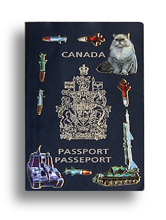
|
Lorna Mills and Sally McKay
Digital Media Tree this blog's archive OVVLvverk Lorna Mills: Artworks / Persona Volare / contact Sally McKay: GIFS / cv and contact |
View current page
...more recent posts
I adored the riot grrrl phase in the 1990s. By then I was already ensconced in my own identitiy as a hetero-feminist freak, more interested in doing my projects and hanging out with interesting people than in weilding the potential power of my sexual persona. Grrrl power, with its focus on girls doing interesting things with their time and having fun too, was a very welcome development. And in my optimistic ignorance I thought it was here to stay. But no, tatoos and piercings and hoodies and choppy hair and boots and loud voices and acting out have been replaced with strapless little tops and silky long hair and demure stances and eye-lash batting and expensive weddings and fear of mice and white wine spritzers and bird-like portions of food and stupid shoes and little handbags and all kinds of other nasty irritating things. So I was interested in the latest Goodreads missive which includes this NY Times article by Maureen Dowd about the lack of feminist ideals among young women today.
I appreciate that Dowd, in her own way, is lamenting the same sad backslide that is bothering lots of my contemporaries. However, her POV is an objectionably two-dimensional corporate world. Dowd describes the post-feminist fate of us poor females who find that career success impedes our chances of snagging a man and tricking him into marrying us. Good golly but that sounds boring! Honestly, the only thing that puts me to sleep faster than someone's office politics is their wedding plans. Dowd's article presents a hegemonic fairy princess world where afterwork martinis and dates with boring corporate guys who foot the bill are all the fun that life has to offer. That is until you fulfill yourself by getting pregnant. Newsflash: procreation is not required. There's nothing exactly wrong with babies, but let's just say that if you don't have one, you will live.
I don't know if Dowd's post-feminist scenario of polished, power hungry pretty young things, caught in a horrible choice between flexing their corporate muscle or playing it soft like a little kitten, really exists. If so, I'm thrilled to be out here in exile. Sure some of my friends are married, some have children, and some are extremely successful in their professions, but they are focused on the content of their projects. It may not always work out perfeclty, but these women want to spend as much time as possible doing exactly what interests them nearly every single minute of the day and have fun doing it. Sound good? It is good ... it's called liberation, women's liberation, and everyone deserves it not just weirdo retro freaks like me.
| Come to the uTOpia book launch on Sunday! (venue: Gladstone, publisher: Coach House) The book is a groovy big anthology all about Toronto. I wrote about Fly gallery, because I find them inspiring. There are gonna be panels and activities at the launch! I'm on a panel at 3:00 with Bert Archer and Sheila Heti, moderated by Misha Glouberman. Our topic is Private Space. I'm also going to be hosting an activity booth where you get to consign your least favourite things about Toronto to the buring pit of hell. I've constructed an extremely classy and operational burning pit, but you'll have to come to the event to get a look at it. In the meantime, here are a couple of dYStopic burning pit images that I found with Google Images. All the details about the event and the book are here. | |
 |  |
Regular guest poster L.M. is on a much deserved break. Thank you, L.M.!! (when you come back we wanna hear your thoughts on France)

 | temporary chair "the event is unattainable..." |





"We feel in wartime comradeship. We confuse this with friendship, with love. There are those who will insist that the comradeship of war is love—the exotic glow that makes us in war feel as one people, one entity, is real, but this is part of war's intoxication. Think back on the days after the attacks on 9-11. Suddenly we no longer felt alone; we connected with strangers, even with people we did not like. We felt we belonged, that we were somehow wrapped in the embrace of the nation, the community; in short, we no longer felt alienated. As this feeling dissipated in the weeks after the attack, there was a kind of nostalgia for its warm glow and wartime always brings with it this comradeship, which is the opposite of friendship.
Friends are predetermined; friendship takes place between men and women who possess an intellectual and emotional affinity for each other. But comradeship—that ecstatic bliss that comes with belonging to the crowd in wartime—is within our reach. We can all have comrades. The danger of the external threat that comes when we have an enemy does not create friendship; it creates comradeship. And those in wartime are deceived about what they are undergoing. And this is why once the threat is over, once war ends, comrades again become strangers to us. This is why after war we fall into despair."
-from a text of a speech by Chris Hedges
(author of "War is a Force That Gives Us Meaning")